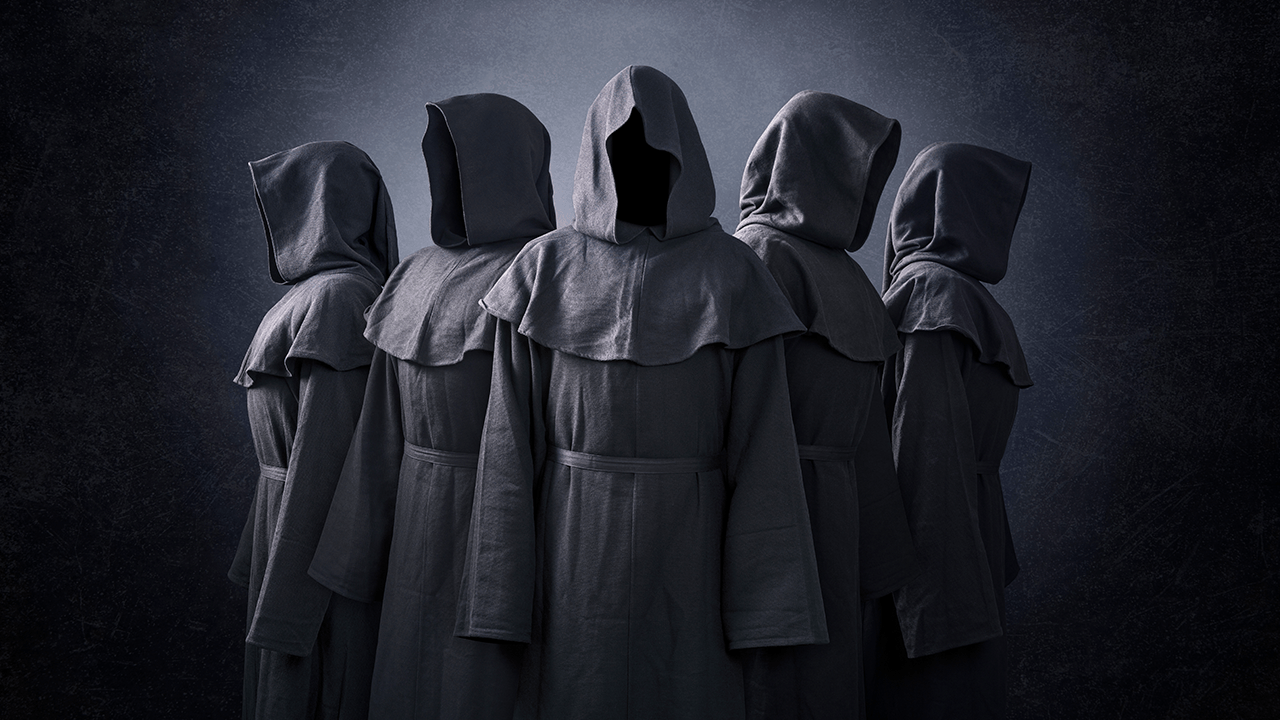SUMMARY
This is AI generated summarization, which may have errors. For context, always refer to the full article.

MANILA, Philippines – Senator Bato dela Rosa said he is convinced that Socorro Bayanihan Services Incorporated (SBSI), a controversial religious group in Socorro, Surigao del Norte, is a cult “by all definitions.”
“Sino bang matinong tao ang iinom ng tae ng kambing para gumaling siya (What person in his or her right mind will drink goat manure for healing)?” said Dela Rosa in an interview with reporters on Monday, October 16, as the Senate investigates SBSI for alleged rape, forced marriages, and other human trafficking activities.
But how does one define a cult?
Legally speaking, there is no widely known definition of “cult” in Philippine laws.
Even Senator Risa Hontiveros, who exposed SBSI in a privilege speech, had to cite “experts” in a Senate hearing to outline “elements” of cults: “excessive control through rigid rules and severe punishments and the suppression of independent thought,” “deviant practices that deviate from social norms and laws,” and a “charismatic leader who encourages blind fanaticism.”
So what do experts say about cults?
Debates have raged for decades about the definition of “cult” – and whether we should use the term at all.
The term “cult” has at least five meanings, according to the Merriam-Webster Dictionary:
- “a religion regarded as unorthodox or spurious”
- “great devotion to a person, idea, object, movement, or work (such as a film or book),” “the object of such devotion,” or “a usually small group of people characterized by such devotion”
- “a system of religious beliefs and ritual”
- “formal religious veneration”
- “a system for the cure of disease based on dogma set forth by its promulgator”
In the Catholic Church, believe it or not, there are also “cults” approved by the Vatican. As a cult can be “a system of religious beliefs and rituals,” there is the “cult of adoration given only to the Most Holy Trinity,” the “cult of the Mother of God,” and the “cult of the saints, especially of the martyrs.”
But the most heated discussions on the term “cult” have taken place in the fields of sociology and psychology. Many sociologists have said it is a “loaded term” imposed by dominant religions, but many psychologists have said it is a “descriptive” word that can sound the alarm on abusive groups.
‘Morally loaded term’
Sociologist of religion Jayeel Cornelio, a professor at Ateneo de Manila University, is one of the many scholars who avoid using the term “cult.”
“It’s a morally loaded term defined for the rest of us by the majority,” Cornelio told Rappler.
He outlined, in a mix of English of Filipino, the implications of the term: “You are a cult because you’re a religious minority. You are a cult because you are practicing these strange worship practices. You have these strange, weird, funny beliefs.” He said this mindset is “not very helpful” because “the majority feels that their own beliefs are unassailable, are not strange.”
He cites as example the Catholic belief in “transubstantiation,” which means that the bread and wine offered at Mass become the real body and blood of Christ – not symbols, but what Catholics call the “Real Presence.” In the early days of Christianity, nonbelievers viewed this as a form of cannibalism, prompting them to persecute Christianity as a “cult.”
Cornelio said transubstantiation is “very strange” in the eyes of nonbelievers. “But nobody will question transubstantiation as a cultic belief because everybody believes in it, believes that doctrine,” he said in the context of the Philippines, a predominantly Catholic country.
The sociologist also noted how people call the SBSI a cult due to sexual abuses within the organization. “But we’re not willing to call the Catholic Church a cult whenever we encounter sexual abuses like this,” he said.
One other example, which Cornelio did not mention, is the Kingdom of Jesus Christ, a religious group led by Pastor Apollo Quiboloy. The group, whose leader calls himself the “Appointed Son of God” and is among the Federal Bureau of Investigation’s “most wanted,” is hardly called a cult by government or mainstream media despite reported cases of sexual and other abuses.
Cornelio encapsulated the irony in a tweet: “If within a minority, we call them cultic practices. But if within a big church, they’re ‘cases of religious abuse.’”
Calling a group a cult, added the sociologist, “assumes that people are brainwashed” – which is a “dangerous” assumption.
Cornelio said the SBSI members he had watched in interviews “seem to be pretty intelligent” and seem to be involved in development work, such as education and livelihood. “These are not the signs of a stupid religious group,” he said, adding that their commitment might have stemmed from “the many things that the church or organization must have done for them.”
Cornelio, a 2021 recipient of the Philippines’ prestigious The Outstanding Young Men award, prefers using the term “religious group” or “new religious movement” instead of “cult.”
A new religious movement (NRM), according to Encyclopedia Britannica, is “the generally accepted term for what is sometimes called, often with pejorative connotations, a ‘cult.’” NRMs are seen as “countercultural” and “often highly eclectic, pluralistic, and syncretistic,” as they are “founded by a charismatic and sometimes highly authoritarian leader.”
Like the term ‘terrorist’
Another sociologist of religion, University of the Philippines professor Gerry Lanuza, also rejects the use of the term “cult.” But he also avoids the term NRM, which he views as Western, and prefers the term “nativistic religions.”
In an interview with Rappler, Lanuza said “cult” is one of the “very controversial and contested” terms in the social sciences. This label is “value-loaded or politically explosive,” said the sociologist, who in 1999 wrote the journal article, “The New Cult Phenomenon in Philippine Society,” in Ateneo de Manila University’s Philippine Studies.
“You immediately assume that the connotation is negative,” he said in a mix of English and Filipino, implying that “there is something dark, hideous” within the organization.
Lanuza said using the term “cult” is akin to using the word “terrorist.” He asked, “Who is the terrorist from whose point of view?”
“Politicians may use the term ‘cult’ to discredit certain groups, in the same way that the state uses ‘terrorism’ or ‘terrorist’ to discredit or label. And that’s very powerful,” he said. This is because once one labels a group or individual as a terrorist or cult member, “it means you have lost your mind.”
Like Cornelio, Lanuza points out abuses in other religious groups, such as the Catholic Church. He cites the example of a priest who was recently dismissed by Pope Francis for alleged sex abuse.
“So will you say now that the Catholic Church is a cult? No. No one will dare say the Catholic Church is a cult,” Lanuza said. “If you say that, 71 million Catholics will be your enemies. But [SBSI] is small – hundreds – just a community. So they cannot do anything. They have no power to contest or to shape the current discourse about them.”

The joke is that the difference between a “religion” or a “cult” lies in the group’s number of members or the length of its existence.
Religious studies scholar Paul Hedges, in his 2021 book, Understanding Religion, wrote: “Max Weber (1864-1920) described a cult as a religion which was newly founded and seeking its place in society. However, this is not an adequate definition, leading to a joke among historians of religion: ‘What is the difference between a cult and a religion?’ Answer: ‘About 100 years.’”
Why others use the term ‘cult’
Clinical psychologist Margaret Singer, in her 1995 book, Cults in Our Midst, offered her own definition of the contested term.
Singer, who died at the age of 82 in 2003, was a professor at the University of California, Berkeley, and was one of the world’s most prominent experts on cults. She was twice nominated for a Nobel Prize, reported The Guardian.
“Cults range from the relatively benign to those that exercise extraordinary control over members’ lives and use thought-reform processes to influence and control members,” Singer wrote in her book.
“While the conduct of certain cults causes nonmembers to criticize them, the term cult is not in itself pejorative but simply descriptive. It denotes a group that forms around a person who claims he or she has a special mission or knowledge, which will be shared with those who turn over most of their decision making to that self-appointed leader,” she said.
In a 2015 article for the International Cultic Studies Association (ICSA), Herbert Rosedale and Michael Langone said that even if they had studied cults for more than 20 years, “neither of us has ever felt completely comfortable with the term cult.”
They delved into the ambiguity of the term cult, which has led ICSA to avoid producing “an official list of cults.”
Rosedale and Langone said, however, that even if the term is “limited,” it is “so embedded in popular culture that those of us concerned about helping people harmed by group involvements or about preventing people from being so harmed cannot avoid using it.”
“Whatever the term’s limitations, it points us in a meaningful direction. And no other term relevant to group psychological manipulation (e.g., sociopsychological influence, coercive persuasion, undue influence, exploitative manipulation) has ever been able to capture and sustain public interest, which is the sine qua non of public education,” the authors said.
“If, however, we cannot realistically avoid the term, let us at least strive to use it judiciously.” – Rappler.com
1 comment
How does this make you feel?
![[OPINION] Religious abuses: Why they happen and what needs to be done](https://www.rappler.com/tachyon/2023/10/tl-religious-abuse.jpg?fit=449%2C449)


![[The Wide Shot] Peace be with China](https://www.rappler.com/tachyon/2024/07/wideshot-wps-catholic-church.jpg?resize=257%2C257&crop=311px%2C0px%2C720px%2C720px)
![[OPINION] A critique of the CBCP pastoral statement on divorce](https://www.rappler.com/tachyon/2024/07/TL-cbcp-divorce-statement-july-19-2024.jpg?resize=257%2C257&crop=285px%2C0px%2C722px%2C720px)
![[REFLECTION] Mary, Mother of the West Philippine Sea](https://www.rappler.com/tachyon/2024/07/may-mother-west-ph-sea-july-19-2024.jpg?resize=257%2C257&crop=293px%2C0px%2C751px%2C750px)
![[OPINION] Ignorance and prejudice](https://www.rappler.com/tachyon/2024/07/tl-ignorance-and-prejujdice.jpg?resize=257%2C257&crop_strategy=attention)
Thanks to Paterno Esmaquel II for his enlightening article, “What is a cult? It’s a decades-long debate.” There are many definitions presented in such an article, but in my personal opinion, the definition should consist of the three elements given by experts during the Senate hearing under Senator Risa Hontiveros. It is time that a law should be passed penalizing “religious abuses.” Both legislative chambers should hurry (except those against it, of course); otherwise, when that “money-eating eagle from Davao City” becomes President, such kind of law will never be passed.